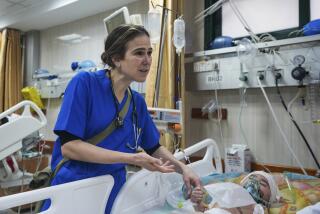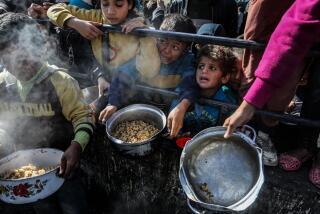Syria’s healthcare system in tatters, aid group warns
BEIRUT -- Almost two years of violence have devastated Syria’s once-extensive healthcare system and left many Syrians unable to access even basic services, representatives of the international aid group Doctors Without Borders said Thursday.
“The situation for Syrian civilians inside Syria is catastrophic,” Christopher Stokes, the group’s general director, told reporters in a conference call. “The aid system is way too limited, and the health system inside Syria has collapsed.”
The conclusions are the latest dire assessment of the fast-deteriorating humanitarian situation inside Syria. Various international experts have warned about the parlous state of Syria’s education system, its physical infrastructure, its food production and distribution networks and other crucial aspects of national life.
On Wednesday, the United Nations said the number of refugees fleeing Syria had exceeded 1 million, while more than 2 million people inside the country have been displaced from their homes.
Among the major healthcare problems: hospitals and clinics have been looted and in some cases bombarded; medicines and pharmaceutical supplies are not available because of damage to factories, supply-line interruptions, and restrictions on trade to Syria; and physicians are in extremely short supply, and have sometimes been targeted.
“It’s incredibly dangerous today to be a doctor inside of Syria,” said Stokes of Doctors Without Borders, widely known as MSF after its acronym in French. “The most basic level of healthcare is no longer available in vast areas of the country.”
Because of the lack of trained physicians, treatments and procedures have at times been left to unqualified personnel.
Experts have also reported periodic food shortages and a lack of clean drinking water inside Syria. MSF reported 1,200 recent cases of typhoid fever in eastern Dair Alzour province and thousands of cases of skin infections in northern Aleppo province.
MSF has opened three clandestine hospitals in opposition-held areas in the north, but has so far been denied permission to work in government controlled zones, the group said.
Apart from bullet and shrapnel wounds and other war injuries, MSF said, people are having trouble finding treatment and medicines for conditions such as diabetes and cancer. In at least one case a person died after receiving a blood transfusion of the wrong blood type. Pregnant women whose deliveries require surgical care may have great difficulty finding appropriate help.
In a study released this week, MSF called on the international community and the Syrian government to remove obstacles to aid.
ALSO:
Leaks to media continue at Vatican gathering
Bid to ban commercial trade in polar bears fails
Number of Syrian refugees tops 1 million, U.N. says
More to Read
Start your day right
Sign up for Essential California for news, features and recommendations from the L.A. Times and beyond in your inbox six days a week.
You may occasionally receive promotional content from the Los Angeles Times.






